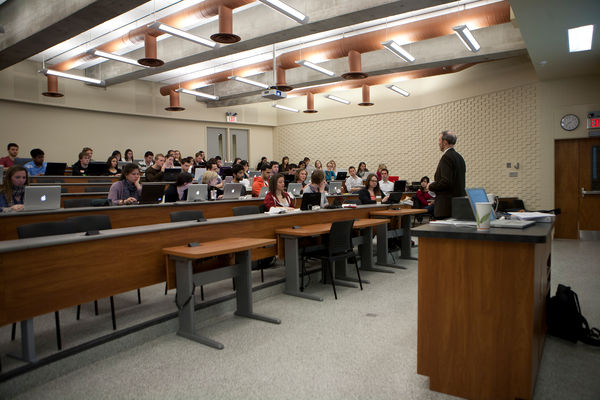Students enjoy helping peers through note-taking program
March 11, 2014
Share
By Mark Kerr, Senior Communications Officer
 Students volunteer to share their lecture notes with other students who find it difficult to take notes because of a physical or cognitive condition.
Students volunteer to share their lecture notes with other students who find it difficult to take notes because of a physical or cognitive condition.Erin Prysiazny (Artsci’16) first volunteered for the note-taker program last fall when she was taking the Introduction to Marketing course. Every week, she submitted her notes from the lectures to Wendy Ross, the coordinator of the program in the Disability Services Office (DSO), who then passed them on to the student who needed them.
Because of the confidential nature of the program, she didn’t interact with the student receiving her notes, leading her to wonder if her work was having a positive impact. However, Ms. Prysiazny was reassured near the end of the semester when the student sent an email message to her through Ms. Ross.
“The email said the person was very thankful for what I was doing,” she says. “It made me realize how great this program is and convinced me to do it again if given the chance.”
Note-taking is an accommodation available to students registered with the DSO who require the service as part of their individualized accommodation plan. The service is for students who find it difficult to take notes in class because of conditions or factors negatively impacting their physical or cognitive ability.
Gillian Thiel (Artsci’16), a volunteer with the program for two semesters, hasn’t received a message from the students using her notes, but she understands her efforts make a difference in the academic life of her peers.
“I am glad we can help out. It’s great that there’s a free service for people with disabilities. I know that at some other universities, the students have to pay for this service,” she says.
Volunteers with the note-taking program send their notes to Disability Services each week. Ms. Thiel scanned her notes last year and sent the files electronically. This year, she is typing her notes and sending in the Word file.
While the students with the disability benefit from the lecture notes, the volunteers find they gain from the exercise.
“It’s actually really helpful knowing that you are taking notes for someone else because you go back through and make sure you understand all the concepts and maybe put in a little clarification if it’s needed,” says Ms. Thiel.
Professors often tell students to review their notes right after the lecture in order to improve the long-term recall of the material. While many don't heed this advice in the rush to complete assignments and essays, volunteers in the note-taking program have another impetuous to take that step.
“You have to re-read the notes and make sure you didn’t write something that wouldn’t be helpful for someone else,” says Ms. Prysiazny. “You reorganize the notes and that helps when studying later on.”
Students often find out about the program by professors announcing in class when a volunteer note-taker is required.
“Faculty members have been receptive of the program and really helped us encourage students to volunteer,” says Ms. Ross. “Without their support, the program wouldn’t be as successful as it has been.”
Ms. Prysiazny speculates that some students might ignore the call for volunteers because they don’t think they have the time to do it.
“But really, you have time for it. It doesn’t take any time at all. Just send the notes after class and it works out,” she says.
“It’s a great experience. You get a volunteer certificate at the end and the DSO is willing to provide a reference as well. All in all, it’s a win-win situation,” adds Ms. Thiel.
Contact Wendy Ross by email to volunteer for the note-taking program.